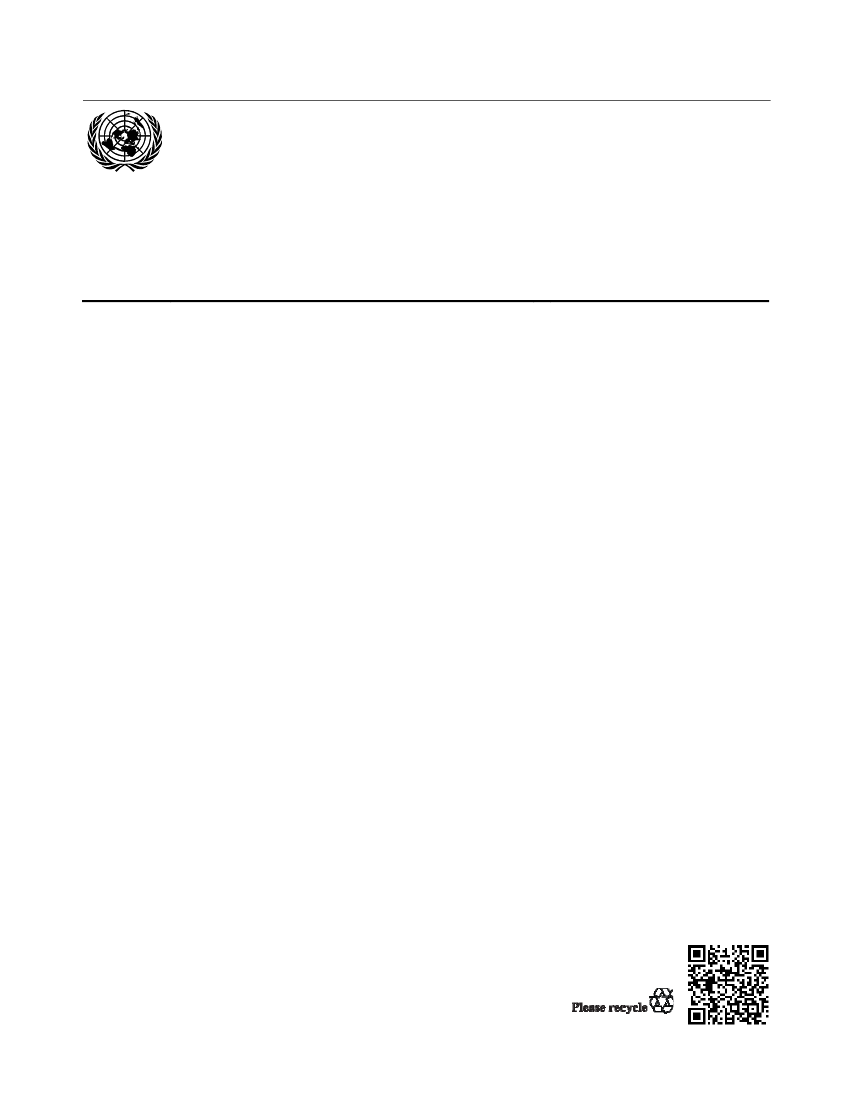Det Udenrigspolitiske Nævn 2012-13, Forsvarsudvalget 2012-13
UPN Alm.del Bilag 98, B 49 Bilag 1
Offentligt
United Nations
S/RES/2085 (2012)Distr.: General20 December 2012
Security Council
Resolution 2085 (2012)Adopted by the Security Council at its 6898th meeting, on20 December 2012The Security Council,Recallingits resolutions 2056 (2012) and 2071 (2012), its PresidentialStatements of 26 March 2012 (S/PRST/2012/7), 4 April 2012 (S/PRST/2012/9) aswell as its Press Statements of 22 March 2012, 9 April 2012, 18 June 2012,10 August 2012, 21 September 2012, 11 December 2012 on Mali,Reaffirmingits strong commitment to the sovereignty, unity and territorialintegrity of Mali,Emphasizingthat the situation and entrenchment of terrorist groups andcriminal networks in the north of Mali continue to pose a serious and urgent threatto the population throughout Mali, and to the stability in the Sahel region, the widerAfrican region and the international community as a whole,Condemning stronglythe continued interference of members of the MalianDefence and Security Forces in the work of the Transitional authorities of Mali,stressingthe need to work expeditiously toward the restoration of democraticgovernance and constitutional order in Mali andtaking noteof the on-going effortsof the Secretary-General, including through the Special Representative of theSecretary-General for West Africa, to assist the Transitional authorities of Mali indeveloping a roadmap for the electoral process and national dialogue,Remaining seriously concernedover the insecurity and the significant ongoinghumanitarian crisis in the Sahel region, which is further complicated by the presenceof armed groups, including separatist movements, terrorist and criminal networks,and their increased activities, as well as the continued proliferation of weapons fromwithin and outside the region that threaten peace, security, and stability of States inthis region,Condemning stronglyall abuses of human rights in the north of Mali by armedrebels, terrorist and other extremist groups, including those involving violenceagainst civilians, notably women and children, killings, hostage-taking, pillaging,theft, destruction of cultural and religious sites and recruitment of child soldiers,reiteratingthat some of such acts may amount to crimes under the Rome Statute andthat their perpetrators must be held accountable and noting that the Transitionalauthorities of Mali referred the situation in Mali since January 2012 to theInternational Criminal Court on 13 July 2012,12-66067 (E)
*1266067*
S/RES/2085 (2012)
Recallingthe letter of the Transitional authorities of Mali dated 18 September2012 addressed to the Secretary-General, requesting the authorization ofdeployment through a Security Council resolution, under Chapter VII as providedby the United Nations Charter, of an international military force to assist the ArmedForces of Mali to recover the occupied regions in the north of Mali andrecallingalsothe letter of the Transitional authorities of Mali dated 12 October 2012addressed to the Secretary-General, stressing the need to support, including throughsuch an international military force, the national and international efforts to bring tojustice the perpetrators of war crimes and crimes against humanity committed in thenorth of Mali,Taking note ofthe endorsement of the Strategic Concept for the Resolution ofthe Crisis in Mali at the second meeting of the Support and Follow-Up Group on theSituation in Mali in Bamako on 19 October 2012, attended by ECOWAS MemberStates, countries of the region and other international partners, as well as itsadoption by the African Union Peace and Security Council on 24 October 2012,Taking note ofthe final communiqué of the Extraordinary Session of theauthority of ECOWAS Heads of State and Government held in Abuja on11 November 2012 and of the subsequent communiqué of the African Union Peaceand Security Council on 13 November 2012 endorsing the Joint Strategic Conceptof Operations for the International Military Force and the Malian Defence andSecurity forces,Welcomingthe appointment of Romano Prodi as Special Envoy of theSecretary General for the Sahel, as well as the appointment of Pierre Buyoya asHigh Representative of the African Union for Mali and the Sahel andencouragingthem to work in close coordination with the Special Representative of the Secretary-General for West Africa and the ECOWAS mediator,Welcomingthe efforts of the ECOWAS-led mediation, with the support of theSpecial Representative of the Secretary-General for West Africa, the Organization ofIslamic Cooperation (OIC) and neighbouring countries of Mali,Taking note ofthe Secretary-General’s report on Mali dated 28 November2012 (S/2012/894) for continued action on the political and security tracks and acomprehensive solution to the crisis affecting Mali,Emphasizingthat the Malian authorities have primary responsibility forresolving the inter-linked crises facing the country and that any sustainable solutionto the crisis in Mali should be Malian-led,Encouragingthe international community to provide support to resolve thecrisis in Mali through coordinated actions for immediate and long-term needs,encompassing security, development and humanitarian issues,Determiningthat the situation in Mali constitutes a threat to internationalpeace and security,Actingunder Chapter VII of the Charter of the United Nations,I.Political process1.Urgesthe transitional authorities of Mali, consistent with the Frameworkagreement of 6 April 2012 signed under the auspices of ECOWAS, to finalize atransitional roadmap through broad-based and inclusive political dialogue, to fully
2
12-66067
S/RES/2085 (2012)
restore constitutional order and national unity, including through the holding ofpeaceful, credible and inclusive presidential and legislative elections, in accordancewith the agreement mentioned above which calls for elections by April 2013 or assoon as technically possible,requeststhe Secretary-General, in close coordinationwith ECOWAS and the African Union, to continue to assist the transitionalauthorities of Mali in the preparation of such a roadmap, including the conduct of anelectoral process based on consensually established ground rules and furtherurgesthe transitional authorities of Mali to ensure its timely implementation;Demandsthat Malian rebel groups cut off all ties to terrorist2.organizations, notably Al-Qaida in Islamic Maghreb (AQIM) and associated groups,and take concrete and visible steps to this effect,takes noteof the listing ofMovement of Unity and Jihad in Western Africa (MUJWA) on the Al-Qaidasanctions list established and maintained by the Committee pursuant to resolutions1267 (1999) and 1989 (2011) andfurther reiterates its readinessto continue toadopt further targeted sanctions, under the above-mentioned regime, against thoserebel groups and individuals who do not cut off all ties to al-Qaida and associatedgroups, including AQIM and MUJWA;Urgesthe transitional authorities of Mali to expeditiously put in place a3.credible framework for negotiations with all parties in the north of Mali who havecut off all ties to terrorist organizations, notably AQIM and associated groupsincluding MUJWA, and who recognize, without conditions, the unity and territorialintegrity of the Malian State, and with a view to addressing the long-standingconcerns of communities in the north of Mali, andrequeststhe Secretary-General,through his Special Representative for West Africa, in coordination with theECOWAS Mediator and the High Representative of the African Union for Mali andthe Sahel, and the OIC, to take appropriate steps to assist the transitional authoritiesof Mali to enhance their mediation capacity and to facilitate and strengthen such adialogue;Condemnsthe circumstances that led to the resignation of the Prime4.Minister and the dismissal of the Government on 11 December 2012,reiteratesitsdemand that no member of the Malian Armed Forces should interfere in the work ofthe Transitional authorities andexpresses its readinessto consider appropriatemeasures, as necessary, against those who take action that undermines the peace,stability, and security, including those who prevent the implementation of theconstitutional order in Mali;Calls uponall Member States to implement their obligations pursuant to5.resolution 1989 (2011) and 2083 (2012) andstrongly condemnsincidents ofkidnapping and hostage taking by Al-Qaida in Mali and across the Sahel region withthe aim of raising funds or gaining political concessions;II.Security processTraining of Malian forces6.Emphasisesthat the consolidation and redeployment of the MalianDefence and Security forces throughout the Malian territory is vital to ensure Mali’slong term security and stability and to protect the people of Mali;UrgesMember States, regional and international organizations to provide7.coordinated assistance, expertise, training, including on human rights andinternational humanitarian law, and capacity-building support to the Malian Defence
12-66067
3
S/RES/2085 (2012)
and Security Forces, consistent with their domestic requirements, in order to restorethe authority of the State of Mali over its entire national territory, to uphold theunity and territorial integrity of Mali and to reduce the threat posed by terroristorganizations and associated groups, furtherinvitesthem to regularly inform theSecretariat of their contributions;Takes noteof the commitment of Member States and international8.organizations to the rebuilding of the capacities of the Malian Defence and Securityforces, including the planned deployment by the European Union of a militarymission to Mali to provide military training and advice to the Malian Defence andSecurity Forces;Deployment of AFISMA9.Decidesto authorize the deployment of an African-led InternationalSupport Mission in Mali (AFISMA) for an initial period of one year, which shalltake all necessary measures, in compliance with applicable internationalhumanitarian law and human rights law and in full respect of the sovereignty,territorial integrity and unity of Mali to carry out the following tasks:(a) To contribute to the rebuilding of the capacity of the Malian Defence andSecurity Forces, in close coordination with other international partners involved inthis process, including the European Union and other Member States;(b) To support the Malian authorities in recovering the areas in the north ofits territory under the control of terrorist, extremist and armed groups and inreducing the threat posed by terrorist organizations, including AQIM, MUJWA andassociated extremist groups, while taking appropriate measures to reduce the impactof military action upon the civilian population;(c) To transition to stabilisation activities to support the Malian authorities inmaintaining security and consolidate State authority through appropriate capacities;(d) To support the Malian authorities in their primary responsibility toprotect the population;(e) To support the Malian authorities to create a secure environment for thecivilian-led delivery of humanitarian assistance and the voluntary return ofinternally displaced persons and refugees, as requested, within its capabilities and inclose coordination with humanitarian actors;(f) To protect its personnel, facilities, premises, equipment and mission andto ensure the security and movement of its personnel;10.Requeststhe African Union, in close coordination with ECOWAS, theSecretary-General and other international organizations and bilateral partnersinvolved in the Malian crisis, to report to the Security Council every 60 days on thedeployment and activities of AFISMA, including, before the commencement ofoffensive operations in the north of Mali, on: (i) the progress in the political processin Mali, including the roadmap for the restoration of constitutional order andnegotiations between the Malian authorities and all parties in the north of Mali whohave cut off all ties to terrorist organizations; (ii) the effective training of militaryand police units of both AFISMA and the Malian defence and security forces in theirobligations under international human rights, humanitarian and refugee law; (iii) theoperational readiness of AFISMA, including the level of staffing leadership andequipment of the units, their operational adaptation to the climate and terrain
4
12-66067
S/RES/2085 (2012)
conditions and ability to conduct joint armed operations with logistical, air andground fire support; (iv) the efficiency of the chain of command of AFISMA,including its interaction with that of the Malian Defence and Security Forces andfurther expressesits willingness to monitor closely these benchmarks before thecommencement of offensive operations in the north of Mali;11.Emphasizesthat the military planning will need to be further refinedbefore the commencement of the offensive operation andrequeststhat theSecretary-General, in close coordination with Mali, ECOWAS, the African Union,the neighbouring countries of Mali, other countries in the region and all otherinterested bilateral partners and international organizations, continue to support theplanning and the preparations for the deployment of AFISMA, regularly inform theCouncil of the progress of the process, andrequeststhat the Secretary-General alsoconfirm in advance the Council’s satisfaction with the planned military offensiveoperation;12.Requeststhe Secretary-General to provide, as and when requested by theMalian authorities, support in critical areas that will be required to accompany orfollow a military operation in the north of Mali, with respect to the extension of theMalian State authority, including rule of law and security institutions, mine action,promotion of national dialogue, regional cooperation, security sector reform, humanrights and the initial demobilization, disarmament and reintegration of formercombatants;International support13.Calls uponMember States, including from the Sahel region, to contributetroops to AFISMA in order to enable AFISMA to fulfil its mandate, welcomes thetroop contributions already pledged by ECOWAS countries andfurther encouragesMember States to cooperate closely with the African Union, ECOWAS, the UnitedNations, countries contributing troops and other donors to this end;14.UrgesMember States, regional and international organizations to providecoordinated support to AFISMA, including military training, provision ofequipment, intelligence, logistical support and any necessary assistance in efforts toreduce the threat posed by terrorist organizations, including AQIM, MUJWA andassociated extremist groups in accordance with paragraph 9 (b), in closecoordination with AFISMA and the Malian authorities;15.Calls uponthe transitional authorities of Mali and all other parties inMali to cooperate fully with the deployment and operations of AFISMA, inparticular by ensuring its safety, security and freedom of movement with unhinderedand immediate access throughout the territory of Mali to enable it to fully carry outits mandate andfurther calls uponneighbouring countries of Mali to takeappropriate measures to support the implementation of AFISMA mandate;16.Demandsthat all parties in Mali take appropriate steps to ensure thesafety and security of humanitarian personnel and supplies, and furtherdemandsthat all parties in Mali ensure safe and unhindered access for the delivery ofhumanitarian aid to persons in need of assistance across Mali, consistent withinternational humanitarian, human rights and refugee law and the guiding principlesof humanitarian assistance;
12-66067
5
S/RES/2085 (2012)
Human rights17.Emphasizesthat the Malian authorities have primary responsibility toprotect civilians in Mali,further recallsits resolutions 1674 (2006), 1738 (2006)and 1894 (2009) on the protection of civilians in armed conflict, its resolutions 1612(2005), 1882 (2009) and 1998 (2010) on Children And Armed Conflict and itsresolutions 1325 (2000), 1820 (2008), 1888 (2009), 1889 (2009), and 1960 (2010)on Women, Peace and Security, andcalls uponall military forces in Mali to takethem into account;18.Emphasizesthat any support provided by the United Nations, regionaland subregional organizations and Member States in the context of the militaryoperation in Mali shall be consistent with international humanitarian and humanrights law and refugee law, furtherrequeststhe Secretary-General to ensure therelevant capacity within the United Nations presence as referred to in paragraph 23below in order to observe adherence to international humanitarian and human rightslaw with regards to military operations in the north of Mali and include in hisregular reports to the Security Council, as referred to in paragraph 24 below, thesituation of civilians in the north of Mali and any violation of human rights law,international humanitarian law and refugee law in the north of Mali, as well as toadvise on ways to mitigate any adverse impact of military operations on the civilianpopulation, including on women and children;19.Calls uponAFISMA, consistent with its mandate, to support national andinternational efforts, including those of the International Criminal Court, to bring tojustice perpetrators of serious human rights abuses and violations of internationalhumanitarian law in Mali;Funding20.Calls uponMember States and international organisations, to providefinancial support and contributions in kind to AFISMA to enable its deployment andimplementation of its mandate andwelcomesthe willingness of the European Unionto provide such financial support to AFISMA through the mobilization of theAfrican Peace Facility;21.Expresses its intentionto consider the provision of a voluntary and aUnited Nations-funded logistics support packages to AFISMA, including equipmentand services for an initial period of one year,takes noteof the letter of theSecretary-General (S/2012/926) on the possible deployment of a logistics supportpackage to AFISMA and on the support financial costs and, to this effect,requeststhe Secretary-General, in coordination with the African Union, ECOWAS and theMalian authorities, to further develop and refine options within 30 days of theadoption of this resolution for such a voluntary and a United Nations-fundedlogistics support packages, including detailed recommendations for a swift,transparent and effective implementation;22.Requeststhe Secretary-General to establish a trust fund through whichMember States can provide earmarked and/or non-earmarked financial support toAFISMA and/or to the training and equipping of Malian Defence and Securityforces, alsorequeststhe Secretary-General to support, in coordination with theAfrican Union and ECOWAS, the holding of a donors conference to solicitcontributions to this trust fund as soon as possible,calls uponMember States tocontribute generously and promptly to the trust fund, while noting that the existence
6
12-66067
S/RES/2085 (2012)
of the trust fund does not preclude the conclusion of direct bilateral arrangementsandfurther requeststhe African Union, in consultation with ECOWAS and theSecretary-General, to submit budgetary request to this trust fund;United Nations presence and reporting23.Requeststhe Secretary-General to establish, in consultation with theMalian authorities, a multidisciplinary United Nations presence in Mali, in order toprovide coordinated and coherent support to (i) the on-going political process and(ii) the security process, consistent with paragraph 12 above and including supportto the planning, deployment and operations of AFISMA and therefore requests theSecretary-General to submit as soon as possible specific and detailed proposals tothe Council for further consideration;24.Requeststhe Secretary-General to keep the Council regularly informed ofthe situation in Mali and to report back to the Council, through the provision ofwritten reports, every 90 days, on the implementation of this resolution, includingon the United Nations support to the political and security efforts to solve the crisisin Mali, the deployment and preparation of AFISMA and updated information andrecommendations related to a voluntary and United Nations-funded supportpackages to AFISMA;25.Decidesto remain actively seized of the matter.
12-66067
7







